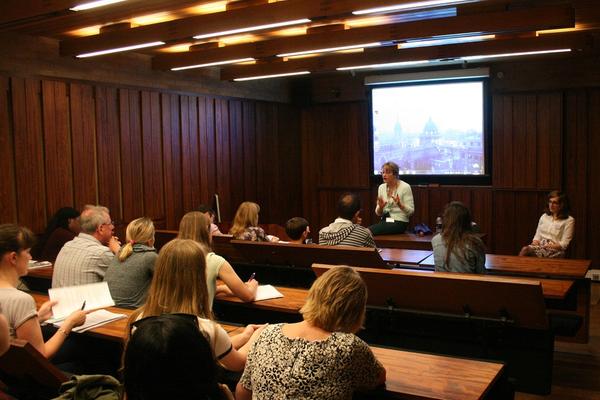Finola Austin
Spotlight on Alumni

When my debut novel was published, one of the first things I did was send two signed copies for the collections at the Merton and Corpus Libraries. I’d spent so much time, so much formative and important time, reading at Oxford that it felt right for part of me to live there permanently between the stacks.
One of my happiest memories of Oxford, aside from learning I would be going there at all (on a cold Christmas Eve morning, kneeling alone in my family’s hallway in Northern Ireland), was the day I received my first reading list. I was about to leave home, but, with that list, I also knew I was coming home to a world of books.
I studied Classics & English, which was hard. My Latin was poor, and my Greek non-existent. But I liked how the course charted genres like Epic and Tragedy through centuries of development. When the English authors I studied referenced classical texts in their works, I’d actually read them in the original. One of the first lectures I attended was on intertext. “All writing is intertextual,” the lecturer told us. By reading as much as I could, I’d be able to enter into conversation with the writers who’d gone before me, even if they’d been dead for centuries.
Victorian novels were my guilty pleasure as well as an academic interest. I was always reading something by Dickens, Hardy, Braddon, Collins, Eliot, Gaskell, or the Brontes, of course. I loved plot as much as prose, and these writers prioritized both. What’s more, the nineteenth century felt familiar, almost shockingly so. The issues of class, empire and gender, which these authors’ works engaged with, were still playing out in our twenty-first-century reality. I stayed on at Oxford to do a Master’s degree in the period and wrote my dissertation on Victorian sensation fiction. My topic was the performative femininity of women in the middle-class home.
And then? I left. I said goodbye to Oxford’s libraries and dining halls and student bars, goodbye to the city where the bells rang out each hour and our calendar was numbered differently than the rest of the world’s, and began a corporate life. First, I moved to London where I worked in public relations. Then, my career took me to New York, where I worked at ad agency Ogilvy, followed by new media company Refinery29. My time at Oxford had taught me how to persuade, both on the page and in person, and how to synthesize large amounts of reading material quickly—a core skill for a strategic planner at an ad agency. But the content of my reading material was of course very different.
Still, I hadn’t entirely abandoned my literary existence. I continued to read nineteenth-century novels, and now also recent historical fiction, constantly. And I started a blog, the Secret Victorianist, to keep up my geeky interests. But I did feel bereft, especially since I’d moved across the Atlantic with only two suitcases, so barely any books.
In 2016, when Refinery29 asked me to stay with them long-term, I made the decision to commit to New York for the long haul, which included shipping the rest of my belongings. The day my boxes arrived I made a promise to myself: I would read every book I owned but hadn’t got to yet. One of these was Gaskell’s The Life of Charlotte Bronte (1857), the first Bronte biography.
In the book, I came across the story that would change everything—the story of Lydia Robinson, the woman rumoured to have had an affair with Branwell Bronte, the Bronte sisters’ brother. Writing about Lydia, in the novel that became Bronte’s Mistress, was a culmination of a lifetime of reading, years of study, and many hours grappling with the Victorian “Woman Question” in Oxford libraries. I wrote the novel in a fever; it was as if the story had been waiting for me. I sold my book in 2019, days before starting a new job at Facebook, and it was ultimately published by Atria Books (Simon & Schuster) in the midst of a global pandemic in 2020.
Not everyone who studies literature aspires to be a writer, but every writer should study literature, whether formally or alone. It was a privilege for me to complete just part of my writing apprenticeship in the beautiful environs of Oxford. Now, when my New York life, balancing two careers, feels too hectic, mentally I’m where those two copies of my book are, snug on the college library shelves.
Finola Austin read Classics & English at Merton College from 2009 to 2012, and completed an MSt in English Literature, 1800-1914 at Corpus College in 2013. Her first novel, Bronte’s Mistress, is out now.
Photo by Nina Subin.






